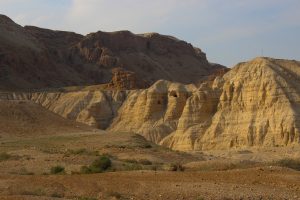Isaiah 1:2-3
2 Hear, O heavens, and give ear, O earth! For the LORD has spoken: “I have nourished and brought up children, and they have rebelled against Me; 3 The ox knows its owner and the donkey its master’s crib; but Israel does not know, My people do not consider.”
Isaiah calls heaven and earth to witness as he speaks the words given to him by God, delivering them in the first person, “I have nourished.” The Lord’s words of correction are spoken as a father to his misbehaving children. God is calling Judah to know and relate to him not as an unapproachable supernatural being, but as their concerned father who possesses an understanding heart. Although this is a foundational theme that Isaiah repeatedly references throughout his prophetic messages, does the Torah also portray God as a father?
God as Father
The concept of God as creator and father is not unique to Judaism and even predates it. The Torah presents the creator as father in the first chapter where he creates man in his image and likeness—establishing a pattern for reproducing image-bearing offspring similar to genetics.[1]
The God of the Bible not only has an image but a character as well. Nurture influences human development, and right from the beginning, God’s role in creation is expressed in down to earth terms of love and commitment. From the opening words of the Torah, God is revealed as provider and guardian,[2] which are characteristics of a good father. More descriptions of God’s character appear in Exodus 34:6 where he is portrayed as “merciful and gracious, long-suffering, and abundant in goodness and truth.” As a loving parent, God consistently demonstrates these attributes to his offspring, which creates a healthy environment for his children to thrive, grow and fulfill their divine genetic potential.
The foundation for Isaiah’s opening words is found in the section of Deuteronomy called the Song of Moses. In the final days prior to his death on Mount Nebo and Israel’s entry to the promised-land, Moses was given a song. It was to be learned by every Israelite and in its entirety speaks of the future apostasy of the nation and its eventual atoning for by God. It is the cornerstone for all communication from God to His people.
1 Give ear, ye heavens, and I will speak; and let the earth hear the words of my mouth. 2 My doctrine shall drop as the rain, my speech shall distil as the dew; as the small rain upon the tender grass, and as the showers upon the herb. 3 For I will proclaim the name of the LORD; ascribe ye greatness unto our God. 4 The Rock, His work is perfect; for all His ways are justice; a God of faithfulness and without iniquity, just and right is He. 5 Is corruption His? No; His children’s is the blemish; a generation crooked and perverse. 6 Do ye thus requite the LORD, O foolish people and unwise? is not He thy father that hath gotten thee? hath He not made thee, and established thee? Deuteronomy 32
These words are spoken from the heart. God had spoken to Israel as a father from its birth at the exodus from Egypt. From the time of the miraculous deliverance and crossing of the Red Sea, Israel had been rebellious. Its character as described in Deuteronomy 32 was corrupt, crooked, and perverse. The character separation between God and Israel is attributed to a blemish, moomam מומם in Hebrew, which can be either a physical or moral flaw. God’s covenant with Israel was established to correct this flawed conduct.
In Moses last words, he cites the song as the pattern for understanding and overcoming the blemish.
46 he said unto them: ‘Set your heart unto all the words wherewith I testify against you this day; that ye may charge your children therewith to observe to do all the words of this law. 47 For it is no vain thing for you; because it is your life, and through this thing ye shall prolong your days upon the land, whither ye go over the Jordan to possess it.’ Deuteronomy 32
Israel, the nation of priests, will discover their inner fault through direct communication with the father. Obedience to His commandments will correct the defect and form a testimony and template for the nations to follow. Moses’ final words are a pattern for worship to the God who is their savior and healer.[3] Awareness of the limitations of self and the crooked paths of human behavior leads to repentance and restoration of the heart.
Other biblical references to God as father can be found in Deuteronomy 8:5 where God chastens Israel “as a man does his son,” in Deuteronomy 32:6 where Moses asked, “Is not He thy father?” and in Proverbs 30:4 where Agur asked about God, “What is his son’s name?”
In the early 1st Century, Philo of Alexandria a Jewish commentator and philosopher wrote the following about his belief in God as both creator and loving father:
[7] For some men, admiring the world itself rather than the Creator of the world, have represented it as existing without any maker, and eternal; and as impiously and falsely have represented God as existing in a state of complete inactivity, while it would have been right on the other hand to marvel at the might of God as the creator and father of all, and to admire the world in a degree not exceeding the bounds of moderation… [9] And those who describe it as being uncreated, do, without being aware of it, cut off the most useful and necessary of all the qualities which tend to produce piety, namely, providence: [10] for reason proves that the father and creator has a care for that which has been created; for a father is anxious for the life of his children, and a workman aims at the duration of his works, and employs every device imaginable to ward off everything that is pernicious or injurious, and is desirous by every means in his power to provide everything which is useful or profitable for them.[4]
Philo describes God as superior to all our knowledge of science and all our achievements. Having set the universe in motion, the Lord remains a proactive loving father ever present in human affairs to achieve good. If God does relate to human beings as a father as the biblical narrative implicates, then why did he take the nation of Israel for himself as a son[5] and a special treasure?[6]
[1] The concept of reproducing image bearing offspring is discussed further in the Connections to Science Chapter.
[2] Genesis 1:1, 29-30, 2:15
[3] Deuteronomy 32:39
[4] Complete Works of Philo of Alexandria; ‘On the Creation’ A TREATISE ON THE ACCOUNT OF THE CREATION OF THE WORLD, AS GIVEN BY MOSES.
[5] Exodus 4:22-23
[6] Exodus 19:4-5




